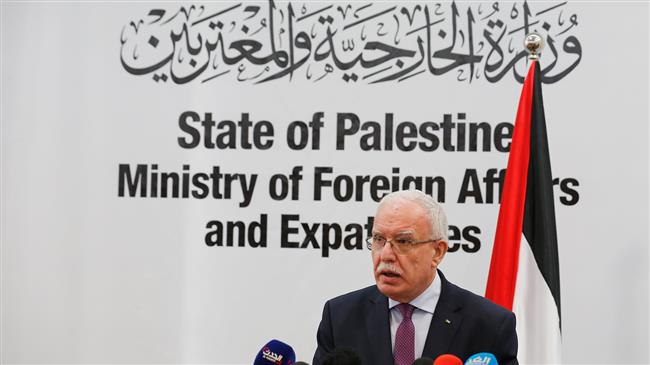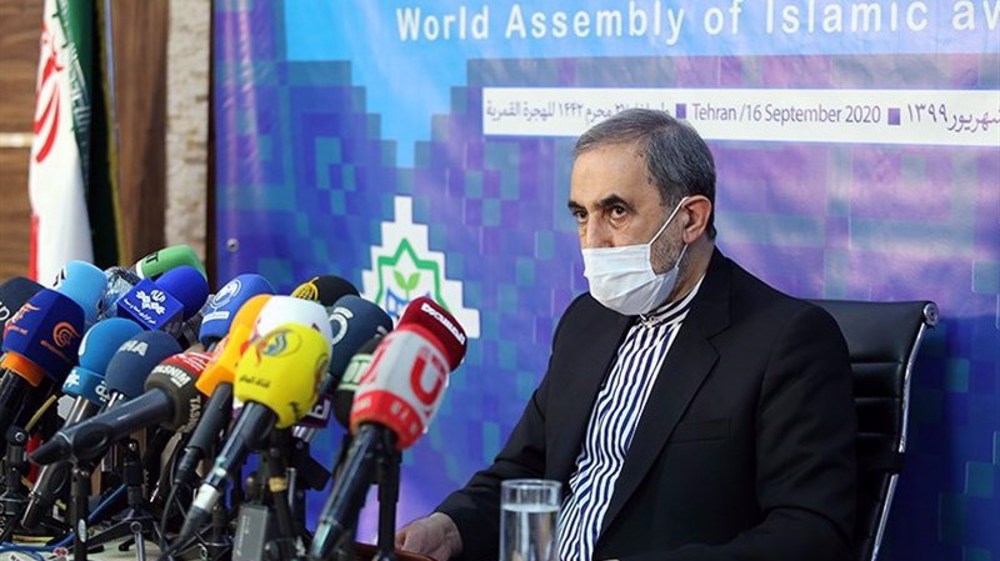Palestine gives up Arab League Council presidency over UAE-Bahrain-Israel normalization agreements
Palestine has decided not to assume the rotating presidency of the Council of the Arab League after the pan-Arab body turned down a Palestinian call to condemn contentious US-mediated normalization deals that the United Arab Emirates (UAE) and Bahrain signed with Israel.
Palestinian Minister of Foreign Affairs and Expatriates Riyad al-Maliki said at a press conference in the occupied West Bank city of Ramallah on Tuesday that the State of Palestine was giving up its right to chair the Council in light of the latest political developments.
“This decision was taken after the Arab League Secretariat took a supporting position to the UAE and Bahrain, which normalized their relations with Israel in violation of the Arab Peace Initiative,” he said.
“Palestine is not honored to witness Arabs scrambling towards normalization [with Israel] during its presidency [of the council],” he said.
Maliki noted that Palestine, however, will not withdraw from the Arab League Council as such a move will create a vacuum and develop unfavorable scenarios.
The top Palestinian diplomat underlined that normalization of ties with the Israeli regime constitutes a flagrant violation of the decisions of summits convened under the Arab Peace Initiative.
The so-called Arab Peace Initiative, which was proposed by Saudi Arabia in 2002, calls on Israel to agree to a “two-state solution” along the 1967 lines and a “just” solution to the Palestinian refugee issue.
Maliki then praised the Arab states that have roundly rejected the possibility of normalization with the Tel Aviv regime, expressing hope that they will stand committed to their position.
He also denounced the Arab League over dropping a Palestinian draft resolution in condemnation of the controversial agreement between the UAE and Israel.
The Palestinian resolution was voted down during a session of Arab League foreign ministers on September 9. The organization blamed the failure to adopt the document on the Palestinians, who said they would either accept a condemnation or no statement at all.
The vote was sharply condemned by all Palestinian factions, with senior Palestinian Authority official Hussein al-Sheikh saying “the Arab League has not produced anything. It has given the entire region condemnations of everyone ad nauseum — except for Israel. This is a thunderous collapse, the use of ‘national sovereignty’ to justify subservience.”
Days later, Israeli Prime Minister Benjamin Netanyahu signed agreements with Emirati Foreign Minister Sheikh Abdullah bin Zayed Al Nahyan as well as Bahrain’s Foreign Minister Abdullatif Al Zayani during an official ceremony at the White House.
Palestinians, who seek an independent state in the occupied West Bank and Gaza, with East Jerusalem as its capital view the deals as betrayal of their cause.
Palestinian President Mahmoud Abbas protested the normalization deals with Israel, saying they will be fruitless as long as the United States and the Israeli regime do not recognize the rights of the Palestinian nation and refuse to resolve the issue of Palestinian refugees.
D-8’s role in Iran’s economy after Cairo summit
China slams US as ‘war-addicted’ threat to global security
China ‘firmly opposes’ US military aid to Taiwan
VIDEO | Press TV's News Headlines
President Yoon Suk Yeol to be removed from office
At least 19 Gazans killed by Israeli airstrikes since dawn: Medics
Leader: Iran neither has nor needs proxy forces
US fighter aircraft shot down ‘in friendly fire’ amid aggression on Yemen



















 This makes it easy to access the Press TV website
This makes it easy to access the Press TV website